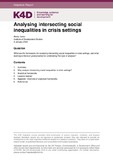| dc.contributor.author | Carter, Becky | |
| dc.date.accessioned | 2022-01-11T09:37:07Z | |
| dc.date.available | 2022-01-11T09:37:07Z | |
| dc.date.issued | 2022-01-05 | |
| dc.identifier.citation | Carter, B. (2022). Analysing intersecting social inequalities in crisis settings. K4D Helpdesk Report. Institute of Development Studies, DOI:10.19088/K4D.2022.003 | en |
| dc.identifier.uri | https://opendocs.ids.ac.uk/opendocs/handle/20.500.12413/17049 | |
| dc.description.abstract | Analysis of intersecting social inequalities is key to effective, inclusive interventions in crisis settings. Gender equality and social inclusion analytical frameworks provide key research questions and participatory methodologies which seek to understand: Who is excluded? How are they excluded? Why are they excluded? What can be done to address this and support greater inclusion? There is a focus on underlying power dynamics, drivers of marginalisation, and entry points for external support.
This rapid review presents a summary of relevant analytical frameworks and good practice for analysing intersecting social inequalities in crisis settings. The focus is on how to undertake contextual analysis of the vulnerabilities and needs of people in crises that are shaped by overlapping and compounding social inequalities, arising from discrimination based on gender, age, disability, sexual orientation, gender identity and/or expression and sex characteristics, ethnicity and religion (among other identifiers).
The review draws on and presents prior research that identified relevant analytical frameworks, learning and key resources on how to undertake this type of analysis, through a rapid literature search and input by key experts. It summarises a range of frameworks relevant for analysing intersecting social inequalities in crisis settings, developed for various development, humanitarian and peacebuilding objectives. It was harder to find published learning from undertaking this analysis that focuses specifically on crisis settings, but it was possible to draw findings from some individual case studies as well as relevant summaries of learning presented in the analytical frameworks and other guidance materials. | en |
| dc.description.sponsorship | FCDO (Foreign, Commonwealth and Development Office) | en |
| dc.language.iso | en | en |
| dc.publisher | Institute of Development Studies. | en |
| dc.relation.ispartofseries | K4D Helpdesk Report;1060 | |
| dc.rights.uri | https://www.nationalarchives.gov.uk/doc/open-government-licence/version/3/ | en |
| dc.subject | Gender | en |
| dc.title | Analysing Intersecting Social Inequalities in Crisis Settings | en |
| dc.type | Helpdesk | en |
| dc.rights.holder | © Crown copyright 2022 | en |
| dc.identifier.doi | 10.19088/K4D.2022.003 | |
| rioxxterms.funder | Default funder | en |
| rioxxterms.identifier.project | K4D | en |
| rioxxterms.version | VoR | en |
| rioxxterms.versionofrecord | 10.19088/K4D.2022.003 | en |
| rioxxterms.funder.project | 0986883a-6d0f-4bb8-9c46-5e0682934d65 | en |

